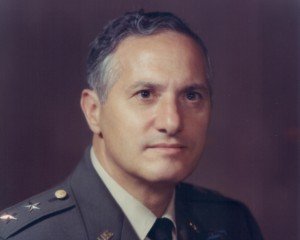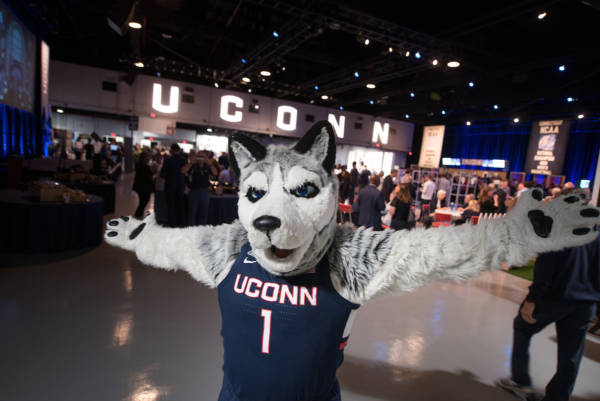War Correspondent Ernie Pyle Chronicled UConn Vet’s Bravery

Theodore Antonelli ’41 Took Germans by Surprise in WWII Battle
Many UConn alumni have graduated from the university’s ROTC program over the years, but one in particular caught the eye of famous war correspondent Ernie Pyle.
Pyle wrote about the bravery of Theodore Antonelli ’41 during the North Africa campaign in World War II in a section of his book, Here is Your War.
Antonelli ’41, who grew up in New Haven, had just graduated from UConn’s ROTC program when he was sent straight to the front lines in Tunisia. In the battle Pyle wrote about, Antonelli’s unit was trying to take back a German-held hill.
The company had been lying hidden in a wheat field during the day, trying to avoid getting shot by the Germans. At dark, the company slowly inched around to the left end of the hill, planning to take the Germans by surprise from behind. When a German shell shattered his commander’s leg, Antonelli, 23, suddenly found himself commander of the company. He ordered the men to fix their bayonets and to yell and scream as they made the attack.
“Lieutenant Antonelli, instead of staying behind his company, pulled out his .45 and led the company up the hill,” Pyle wrote. “Usually a company commander doesn’t do that, but at the time it was the thing to do. Antonelli paid for his bravery. A hand-thrown German grenade scattered fragments over his chest and he fell.”
Antonelli later said that he led the charge because he was trying to motivate his men.
“I did it to try and get people up off the ground to move up,” Antonelli explained in an article in The Pentagram newspaper of Ft. Myer Military District of Washington.
His men respected him, his cousin, Albert Grimaldi ’60, ’64 said.
“The forces he was in charge of admired him. He was an extremely nice guy,” Grimaldi said. “He had an excellent personality.”
There was so much blood from Antonelli’s chest wound that he later confessed to his son that he thought he was going to die right there on the hill.
“He bore a scar from that wound. It missed his heart by a quarter of an inch,” his son, William Antonelli ’70 says. “It was a deep wound and they didn’t do any cosmetic surgery in those days.”
Antonelli’s wounds put him out of action for a while, but the battle broke through the Germans’ defense and gave the Allies a toehold in the war.
After he was released from the hospital, Antonelli served in Italy and participated in the amphibious landings at Anzio and Salerno.
His son says he is very proud of his father, but never knew about his famous charge during that battle until he read about it later. He says he had a hard time reconciling the warrior in the story with the dignified man who was his father.
“I could never reconcile the combat record. He was always a gentleman to his friends,” Williams says. “He was a wonderful father to me. He was a best friend to me. He liked adventure. He liked to do the things that I liked to do. He was also a perfectionist, he was hard. He had a very high bar.”
The son of an Italian immigrant who was a talented New Haven tailor, Theodore Antonelli worked his way through college and was proud to be a UConn graduate, his son says.
“He was very proud of the university,” William Antonelli said.
UConn’s ROTC program graduates about 30 commissioned officers a year and has been operating ever since the university was founded in 1881.
After the war, Antonelli earned his master’s degree in international affairs from George Washington University. His later career centered on the Army Transportation Corps. He served at bases in the US, Korea, and Germany. In 1953, he participated in scientific research activities on the Greenland Ice Cap, including leading a reconnaissance party there.
He later graduated from Command and General Staff College, the Army War College, the Industrial College of the Armed Forces, and the Army Transportation School.
During his life, he held several posts in Washington, including the director of distribution and transportation with Army Materiel Command. He also served in the war in Vietnam.
He was appointed Major General in 1974 and was commandant of the Industrial College of the Armed Forces before retiring in 1978. He earned two Silver Stars, two Distinguished Service Medals, a Purple Heart and several other medals during his distinguished career. He died in 1993 and is buried in Arlington National Cemetery.
